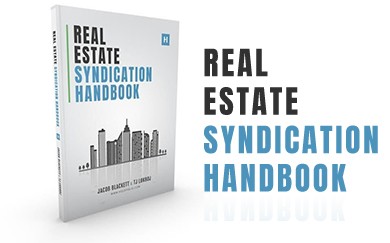Real estate syndication is a great way to diversify your investments. If you are considering investing in real estate, or already have, then real estate syndication may be something that interests you.
It allows investors to pool their money together and share the profits of those deals without having to worry about things like managing tenants and hiring contractors for repairs. The benefits of this type of investment can be substantial and it’s definitely worth looking into further if you haven’t done so already!
Investing in real estate syndication comes with a number of benefits, one of them being lucrative tax benefits. Of course, taxes are about the last thing on an investor’s mind before their first syndication investment, however, taxes aren’t always seen as a bad thing. Why? That’s because tax regulations generally favor real estate investors.

Table of Contents
Real Estate Syndication Treatment
Several tax loopholes and tax benefits come with investing in real estate. Real estate investors can enjoy tax benefits in the form of deductions. These might include:
- Depreciation Recapture
- Capital Gains
- Refinancing
- Mortgage Interests
- Deferring income taxes
As a limited partner in a syndication deal, you’re a passive investor, earning passive income, who can still share many tax-perks that the exclusive partnership enjoys. The government rewards real estate investors to encourage productivity within the national economy.
To the government, people who create businesses, and investors who fund them, including real estate investors, are invaluable to the economy. So, they look for ways to grant tax benefits through tax deductions to encourage them.
On top of that, real estate investors get special treatment when paying taxes because of the extra advantage of depreciation. Due to depreciation, the IRS will regard a property that is usually earning money as losing money. So, the investor doesn’t have to pay any taxes on their annual returns.
As Tom Wheelwright, author of the book Tax-Free Wealth, puts it, the government isn’t in the market of providing housing and commercial space to the public. It, therefore, needs people to supply publicly accessible housing and commercial spaces to manage the nation’s housing market.
Depreciation
One of the most vital wealth-creating pathways in the real estate industry is that depreciation allows you to write off an asset’s worth with time. Here’s what depreciation looks like: suppose you purchased a new car, working perfectly at the point of purchase. With time, the tires start wearing down and the engine starts losing its strength. After a while, the car would eventually break down and might be worth no more than its scrap value.
That’s precisely the basis for depreciation when investing in real estate. The tax office understands that all real estate properties reduce in value, and without continuous maintenance, would lose most of their initial value. So, the IRS allows property owners to write off a home’s worth, excluding the land it’s built on, over 27.5 years.
If the building costs $1.65m, that’s $60,000 off each year due to depreciation. That is, if you made $10,000 on the property the first year, in cash flow, you wouldn’t pay any taxes on it—depending on your tax situation. The tax office considers that you lost $60,000 that year, but you made $10,000! Moreover, houses bought after September 27, 2017, can enjoy bonus depreciation, further increasing the tax benefits for the first year.
Capital Gains
When an investor makes a profit from the sale of an investment, the return is what we term capital gains. The US Internal Revenue Service collects taxes from such profits from each investor (of course, other tax situations or exceptions may apply). Typically, such taxes are levied as a one-off investment. That is, one doesn’t have to pay them each year.
Moreover, an investment could have a short-term gain, or a long-term gain, depending on the lifespan of the buy. Investments that take less than one year, such as a fix-and-flip project, are short-term. Conversely, projects that take longer take the tag of long-term investments. In the United States, the Internal Revenue Service taxes short-term capital gains in the same vein as your earnings from your job.
Depending on the taxpayer’s taxable income, the IRS levies capital gains tax at 0%, 15%, or 20%. Under the most recent 2018 tax law, here’s a breakdown of the different tax brackets:
- $77,220 and under: 0% capital gains tax
- $77,221 to 479,000: 15% capital gains tax
- Above $479,000: 20% capital gains tax
So, here’s the good news. Capital gains taxes (even at 20%) are lower taxes on earned income. Long-term investments such as investing in real estate syndications cap out at a maximum of 20% tax rate, which is far better than, say, the rate for tax payers in the 37% marginal tax bracket.

Refinancing
One of the other ways both new and experienced investors in real estate syndication can enjoy tax benefits is refinancing. With easy-to-access tax reliefs, the idea of refinancing has proven itself to be a great way to buy different real estate assets, inclusive of syndications. An investor can borrow against appreciation and increase asset equity with a refinance without having to pay taxes.
Here’s how it works. If, for instance, someone purchased an apartment building property for five hundred thousand dollars. The investor renovated the property and consequently yielded higher rents as the market improved. This property now has an additional five hundred thousand dollars in appreciation and is worth a million dollars.
The investor could now execute a cash-out refinance and take out $500,000 towards purchasing another building. Based on the IRS rules, this process is entirely tax-free. The same scenario works with any investment in real estate syndications.
Value-add syndicators could optimize a property’s worth over about two years after renovating the property to command higher rents. They could readily walk into the bank to refinance the property and withdraw equity. Any investor could utilize cash-out refinancing to keep increasing their passive income sources without paying more in tax.
Mortgage Interest Deduction
The mortgage interest tax deduction lets investors deduct money paid in mortgage interest during the tax year from their taxable income. Here’s a summary of what it’s like. Homeowners who bought their primary residence or second home after Dec. 15, 2017, qualify for a deduction for the first $750,000 of mortgage debt, according to the Tax Cuts and Jobs Act.
One beneficial aspect of mortgage interest deductions is that they apply to your marginal income, and consequently, your most effective marginal tax rate. Whether you have a mortgage high enough to enjoy maximum mortgage tax deduction or not entirely, you can save some money on your taxes.
However, a mortgage tax deduction isn’t beneficial for persons or entities in the 12% federal tax bracket and below. Such investors would need a huge mortgage to receive any interest deduction. That’s because the standard deduction is $12,000 for singles and $24,000 for married couples.
Note though, that homeowners aren’t the only ones who can enjoy the benefit of deducting mortgage interest paid on their primary residence. Similarly, real estate syndication investors can deduct the interest on a mortgage loan.
As with depreciation deduction, this is an excellent option for lucrative tax benefits available for investors in real estate syndications who are not investing over the long term. In the earlier years of a mortgage loan, most of the repayment goes into the interest.
The main benefit of obtaining the mortgage interest tax deduction is that it offers you a tax break. If real estate syndication investors would do their due diligence, understanding it can help reduce their taxable income and potentially even change their tax rate.
The bottom line is saving yourself hundreds or (possibly) thousands of dollars over the span of your mortgage. Nevertheless, don’t hesitate to refer to your tax professional for personalized counsel on making your tax decisions.
FAQs on Real Estate Syndication Tax Benefits

You can earn significant passive income through investing in real estate syndication without ever worrying about your tax bill. Here, we address the most common questions from aspiring investors looking at real estate syndication.
How Are Real Estate Syndicates Taxed?
General partners and limited partners in real estate syndications pay taxes differently. This is because general partners get extra fees which are taxed differently to the regular cash flow and sales proceeds. You want to discuss with your tax professional to ensure you’re using the appropriate tax strategies to minimize your tax as much as possible.
Typically, general partners get an acquisition fee, ranging from one to three percent of the property’s purchase price for their roles in the syndication. This acquisition is regarded as ordinary income and bears self-employment tax.
Additionally, general partners get an asset management fee, ranging from one to three percent of the collected gross rent, which comes under self-employment tax. Sometimes, a real estate syndication charges other fees like construction fees, refinancing fees, or disposition charges. All these fees are subject to self-employment taxation like the asset management and acquisition fees.
On the other side of the coin, the general partner’s income is part of the cash flow from the interest on the investment. Depending on the holding period, the proceeds of the sale are taxed as either a short-term capital gain or long-term capital gain. The IRS levies a passive rental income or loss—as applicable—on this income. Lastly, general partners have to pay appreciation recapture tax on depreciation on their investment interest.
Limited partners get different fees from general partners since they’re not actively participating in the routine management investment. Their aim of investing is to earn a return on their investment from the cash flow on the investment. So, like with general partners, this income is taxed as a passive rental income or passive income loss.
Also, the IRS will tax short-term or long-term capital gains, depending on the holding period of the sales proceeds. Other taxes applicable to limited partners are depreciation recapture (as appropriate) and a share of the income or loss on Form K-1 when filing in the partnership tax return.
Can You 1031 Out of a Syndication?
Yes, you can carry a 1031 Exchange out of a real estate syndication into other investments. Here are the requirements for doing a 1031 exchange according to the US Internal Revenue Code:
- The property you’re selling must be an investment property
- The investment you’re buying must be of “like-kind”
- The purchased property must be at least the same value as the relinquished property or more
- Both the person or entity that submitted property and the person buying the new property must be the same
- Sales proceeds must be held in an escrow account
- The purchased property must be identified within 45 days after closing on the relinquished property.
- The purchase must be completed within 180 days of closing on the sold property.
Typically, a 1031 Exchange offers two significant benefits: a preferred return based on a higher investment amount and deferred taxes. Once you’re ready to do a 1031 exchange, you need to consult a 1031 exchange consultant. These consultants are intermediaries who specialize in 1031 exchanges.
It can be difficult to find 1031 exchange consultants. The best way is by receiving a recommendation from someone you trust who has used their service before. A friend, family member, or business associate with whom they’ve had positive experiences working together, for example. If that doesn’t work, try third party websites like Yelp where reviews can help to inform your decision.
The company you eventually choose will send you an outline of their 1031 Exchange process and ask you to fill a Form W-9.
Alongside filling the Form W-9, the company will require that you provide them with some details such as the following:
- Name and contact information of the person(s) or entity (or who will sign on behalf of) in the title, and the type of entity (whether single-member LLC, partnership, large firm, etc.?)
- Copy of the purchase and sale agreement
- Address of the property under consideration
- Name of the buyer
- Tentative closing date
- Name and contact information of title company or closing attorney handling the sale.
Your 1031 consultant will roll out your sale proceeds into a new deal and keep you informed on the subsequent obligations and rewards involved.
How Can I Lower My Taxable Income in Real Estate?
Depreciation is the most straightforward way for passive investors to reduce taxable income in the real estate industry. Typically, depreciation is a term that expresses the reduction in the value of a tangible asset such as equipment or a building. As you may already know, wear and tear, age, and usage are the most significant causes of the decrease in any property’s value.
There are different ways you could calculate the value of depreciation on your real estate syndication investment. Some calculators are based on the straight-line depreciation method, whereby users will input the number of years or months to depreciate the property.
Then there are reducing balance method calculators, a strategic tax planning tool, that’s based on the annual depreciation rate and the initial worth of the asset.
Other tools are the annuity, the composite method, and the sum of years’ digits. For instance, the composite method considers factors like the depreciable and historical cost, the useful life of an asset, and the salvage value.
The tax office calculates the depreciation expense as accumulated depreciation and deducts it from the gross amount reported on the asset. That’s not all. The amount of accumulated depreciation also increases annually in your tax bill. That means you can enjoy more deductions from your investment gains with time over accumulated depreciation.
If you still have more questions on real estate investing or how to offset passive gains, the real estate experts at Holdfolio investments can help you. You can also contact your tax professional for more personalized information on all the tax benefits, depreciation deductions, tax-deferred benefits, and accelerating depreciation deductions, which may apply to your situation. Otherwise, contact an experienced real estate professional at Holdfolio.
 Back to Blog
Back to Blog




